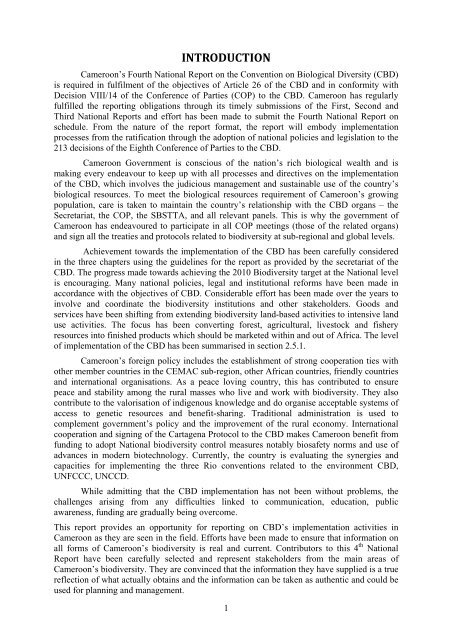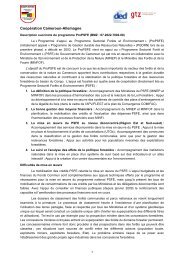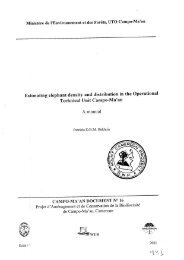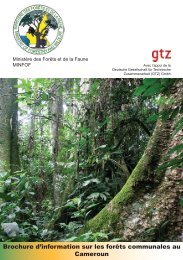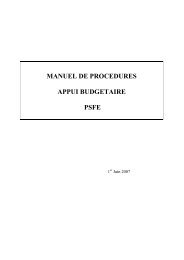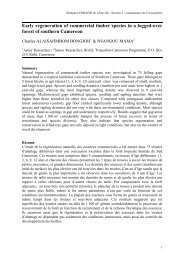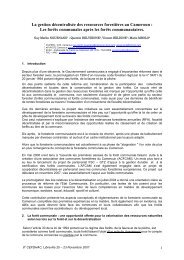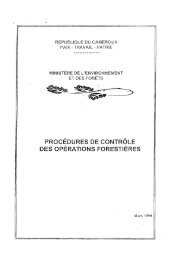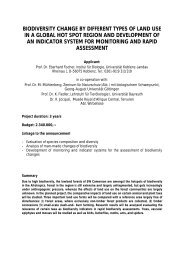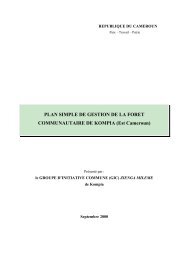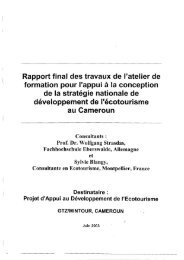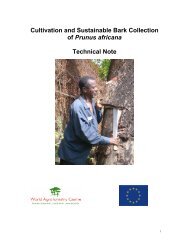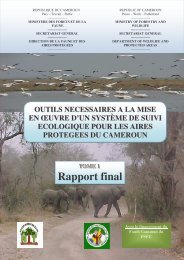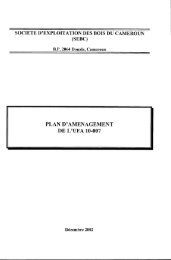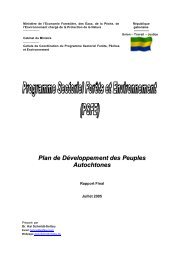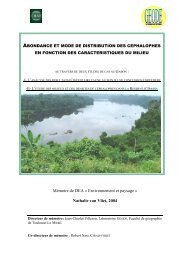cameroon fourth national report - Impact monitoring of Forest ...
cameroon fourth national report - Impact monitoring of Forest ...
cameroon fourth national report - Impact monitoring of Forest ...
You also want an ePaper? Increase the reach of your titles
YUMPU automatically turns print PDFs into web optimized ePapers that Google loves.
INTRODUCTION<br />
Cameroon’s Fourth National Report on the Convention on Biological Diversity (CBD)<br />
is required in fulfilment <strong>of</strong> the objectives <strong>of</strong> Article 26 <strong>of</strong> the CBD and in conformity with<br />
Decision VIII/14 <strong>of</strong> the Conference <strong>of</strong> Parties (COP) to the CBD. Cameroon has regularly<br />
fulfilled the <strong>report</strong>ing obligations through its timely submissions <strong>of</strong> the First, Second and<br />
Third National Reports and effort has been made to submit the Fourth National Report on<br />
schedule. From the nature <strong>of</strong> the <strong>report</strong> format, the <strong>report</strong> will embody implementation<br />
processes from the ratification through the adoption <strong>of</strong> <strong>national</strong> policies and legislation to the<br />
213 decisions <strong>of</strong> the Eighth Conference <strong>of</strong> Parties to the CBD.<br />
Cameroon Government is conscious <strong>of</strong> the nation’s rich biological wealth and is<br />
making every endeavour to keep up with all processes and directives on the implementation<br />
<strong>of</strong> the CBD, which involves the judicious management and sustainable use <strong>of</strong> the country’s<br />
biological resources. To meet the biological resources requirement <strong>of</strong> Cameroon’s growing<br />
population, care is taken to maintain the country’s relationship with the CBD organs – the<br />
Secretariat, the COP, the SBSTTA, and all relevant panels. This is why the government <strong>of</strong><br />
Cameroon has endeavoured to participate in all COP meetings (those <strong>of</strong> the related organs)<br />
and sign all the treaties and protocols related to biodiversity at sub-regional and global levels.<br />
Achievement towards the implementation <strong>of</strong> the CBD has been carefully considered<br />
in the three chapters using the guidelines for the <strong>report</strong> as provided by the secretariat <strong>of</strong> the<br />
CBD. The progress made towards achieving the 2010 Biodiversity target at the National level<br />
is encouraging. Many <strong>national</strong> policies, legal and institutional reforms have been made in<br />
accordance with the objectives <strong>of</strong> CBD. Considerable effort has been made over the years to<br />
involve and coordinate the biodiversity institutions and other stakeholders. Goods and<br />
services have been shifting from extending biodiversity land-based activities to intensive land<br />
use activities. The focus has been converting forest, agricultural, livestock and fishery<br />
resources into finished products which should be marketed within and out <strong>of</strong> Africa. The level<br />
<strong>of</strong> implementation <strong>of</strong> the CBD has been summarised in section 2.5.1.<br />
Cameroon’s foreign policy includes the establishment <strong>of</strong> strong cooperation ties with<br />
other member countries in the CEMAC sub-region, other African countries, friendly countries<br />
and inter<strong>national</strong> organisations. As a peace loving country, this has contributed to ensure<br />
peace and stability among the rural masses who live and work with biodiversity. They also<br />
contribute to the valorisation <strong>of</strong> indigenous knowledge and do organise acceptable systems <strong>of</strong><br />
access to genetic resources and benefit-sharing. Traditional administration is used to<br />
complement government’s policy and the improvement <strong>of</strong> the rural economy. Inter<strong>national</strong><br />
cooperation and signing <strong>of</strong> the Cartagena Protocol to the CBD makes Cameroon benefit from<br />
funding to adopt National biodiversity control measures notably biosafety norms and use <strong>of</strong><br />
advances in modern biotechnology. Currently, the country is evaluating the synergies and<br />
capacities for implementing the three Rio conventions related to the environment CBD,<br />
UNFCCC, UNCCD.<br />
While admitting that the CBD implementation has not been without problems, the<br />
challenges arising from any difficulties linked to communication, education, public<br />
awareness, funding are gradually being overcome.<br />
This <strong>report</strong> provides an opportunity for <strong>report</strong>ing on CBD’s implementation activities in<br />
Cameroon as they are seen in the field. Efforts have been made to ensure that information on<br />
all forms <strong>of</strong> Cameroon’s biodiversity is real and current. Contributors to this 4 th National<br />
Report have been carefully selected and represent stakeholders from the main areas <strong>of</strong><br />
Cameroon’s biodiversity. They are convinced that the information they have supplied is a true<br />
reflection <strong>of</strong> what actually obtains and the information can be taken as authentic and could be<br />
used for planning and management.<br />
1


